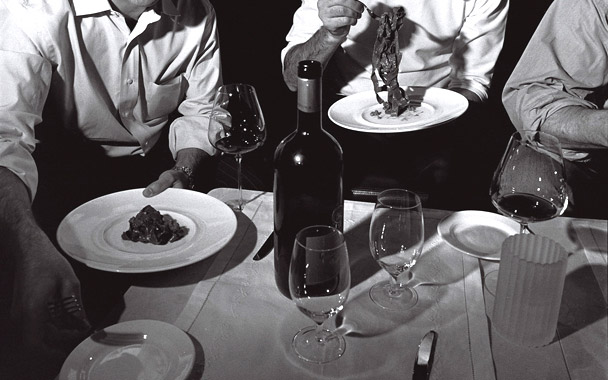There’s a joy to traveling as a vacation. You spend a few days hanging around in cafés and museums, you walk the streets for a dozen miles, have a late dinner at an outside table on the square, and then you move on. But there’s a different joy to living and working somewhere foreign. It’s the rhythm of the everyday, the sense of belonging somewhere, the growing comfort of new routines. My family and I have been in Hamburg for almost three months now, long enough to have found new grooves and pleasures. For me, one of the nicest has been lunch.
In Germany it’s traditional to have the main meal in the middle of the day; at night a typical Abendbrot (“evening bread”) might be just some bread and cheese. This takes some getting used to for foreigners. (And not just the Americans: My Dutch colleague Thijs—pronounced like “Twice” without the “w”—is used to bread and cheese at lunch and “eating warm” in the evening.) My family has adopted the simple evening meal about half the time, and on those evenings we spend less time fussing about in the kitchen and more time with each other.
But the importance of lunch we have adopted wholeheartedly. Every day I join my colleagues in one of the cafés or restaurants near the Institute. Some days there are two of us, some days six, and when a speaker comes from out of town there might be a dozen. The meals are simple and inexpensive (we almost never pay more than 6 Euro, or about $8.50), but the food is made with care from high-quality ingredients. It is, you might say, food for the long run, the kind of meals one can eat every day for months or years, and after three months I’ve had lunch at least once with almost everyone in the department.
And it’s no coincidence that my two-year old has a similar experience in her kita (day-care). The first time we visited I was astonished to see that the building, which houses fewer than 30 kids, has a dedicated kitchen and a part-time cook making meals from scratch. But in the months since then, my own colleagues have become my friends over plates of pasta and strong cups of coffee, and my daughter has found her feet and her voice in this new culture. Now that children’s kitchen looks like an investment, or maybe set of training wheels on the road to discovering the pleasures of community. Both of us have formed bonds with the people we eat with – and this, I suspect, is precisely the point. The roots of the word “companion,” after all, are “those with whom we share bread.”
We came to Germany looking for good work and a family adventure. We never expected to feel like we could belong.




 Pinterest
Pinterest


